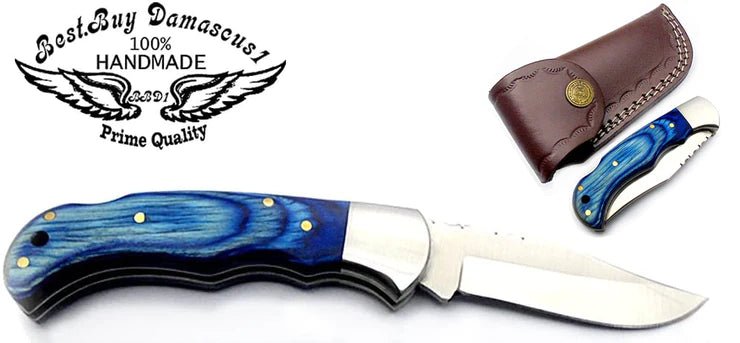
What Is The Damascus Knife?
Posted by Best.Buy. Damascus1 on
Damascus steel is an easily recognizable type of steel that takes on a distinctive look due to its wavy pattern design. Although this steel is known for its smooth appearance and beautiful aesthetics, Damascus steel is highly valued because it is hard and flexible while maintaining a sharp blade.
Damascus steel as a blade material originated with European and Asian swordsmiths. They realized early on that forging and bending at least two different types of steel would produce a higher quality and stronger steel. The distinctive pattern on the blade of the steel knife also gives this steel a special look, making it stand out.
These knives have always fascinated people and continue to fascinate people to this day due to their quality and functionality for a variety of tasks.
This durable steel is made with a wavy surface pattern that is formed by hammering strips of steel and iron, followed by repeated forging and heating. Once mainly used for knife and sword blades, Damascus steel is now used for pocket knives, butterfly knives, fixed-blade knives, and swords.
How Damascus steel got its name
The origin of the name Damascus steel is somewhat legendary. Some claim that two Islamic scholars, Al-Kindi and Al-Biruni (circa 800-873 AD), wrote about swords and steels based on their appearance, the geographical location where they were manufactured or forged, and the name of the blacksmith who made them. In both their writings, the word 'damascene' or 'Damascus' was used to some extent to describe swords.
How Damascus knives are made
Over the years, many changes have been made to the original Damascus steel production process. Modern Damascus steel is made by either forging different types of steel together, before beating, twisting, and manipulating the metal or by smoothing and then bending one type of steel to form layers of metal. Both of these techniques result in the organic pattern characteristic of Damascus knives.
Although the techniques used today are mainly for aesthetic reasons, the advantage of the folding and refolding process is that the impurities in the metal are smoothed out. More modern techniques, such as acid etching, can also be used to enhance the unique pattern created by the process.
If you go for a comparison, you will see that ancient Damascus steel is completely different from modern Damascus steel. The precise knowledge and techniques used to produce this type of steel have now been lost to history.
What to look out for when buying a Damascus knife
Carving knife with grilled meat
Of the wide range of gourmet knives, only a knife made of strong and durable Damascus steel is a favourite with culinary experts.
Here is a list of some of the things to consider when buying a Damascus knife for your kitchen:
Durability
Damascus steel knives are best known for their extreme hardness. More hardness means less stress on the edge of the blade, so it lasts longer.
Performance
In the world of blades, performance depends on how well and to what extent the steel blade is able to cut the food perfectly. This means that a blade is only as good as its hardness. Hard metal knives made from Damascus steel hold their unique blade for much longer than soft metal knives. Damascus steel cutting blades usually have smaller blades, so they cut meat more efficiently.
Financial constraint
In general, Damascus knives are more expensive than conventional kitchen knives. So be prepared to spend a little more out of pocket when looking for a Damascus steel knife, but rest assured that these knives are a great investment for any chef, home cook, or professional.
How to care for Damascus steel knives
A Damascus steel knife that has been carefully crafted over hundreds of hours deserves the utmost care and attention. A heritage masterpiece must be protected to ensure maximum longevity. Damascus steel needs special care to retain its original luster and beauty.
It should be remembered that many hand-forged Damascus blades are made from steel with high carbon content and chromium content in the alloy. If such steel is not properly cared for, the blade can easily rust. Collectors should ensure that the blades are clean and avoid rust or stains.
Recommendations for Damascus knives
In addition to reliable and sturdy kitchen utensils, an apron, and a robust cutting board, every kitchen needs a strong and sharp Damascus steel knife.
Do you want to invest in a Damascus knife for your kitchen? While there are many options, some stand out more than others. These knives are made using a special technique that results in a unique wavy, speckled pattern across the blade.
You can find a Damascus steel knife in almost any style and for almost any purpose, so choosing the right knife can be a little confusing. So, if you're wondering which Damascus option is right for you, check out our selection of the best Damascus steel knives and find the perfect one for your kitchen needs.

